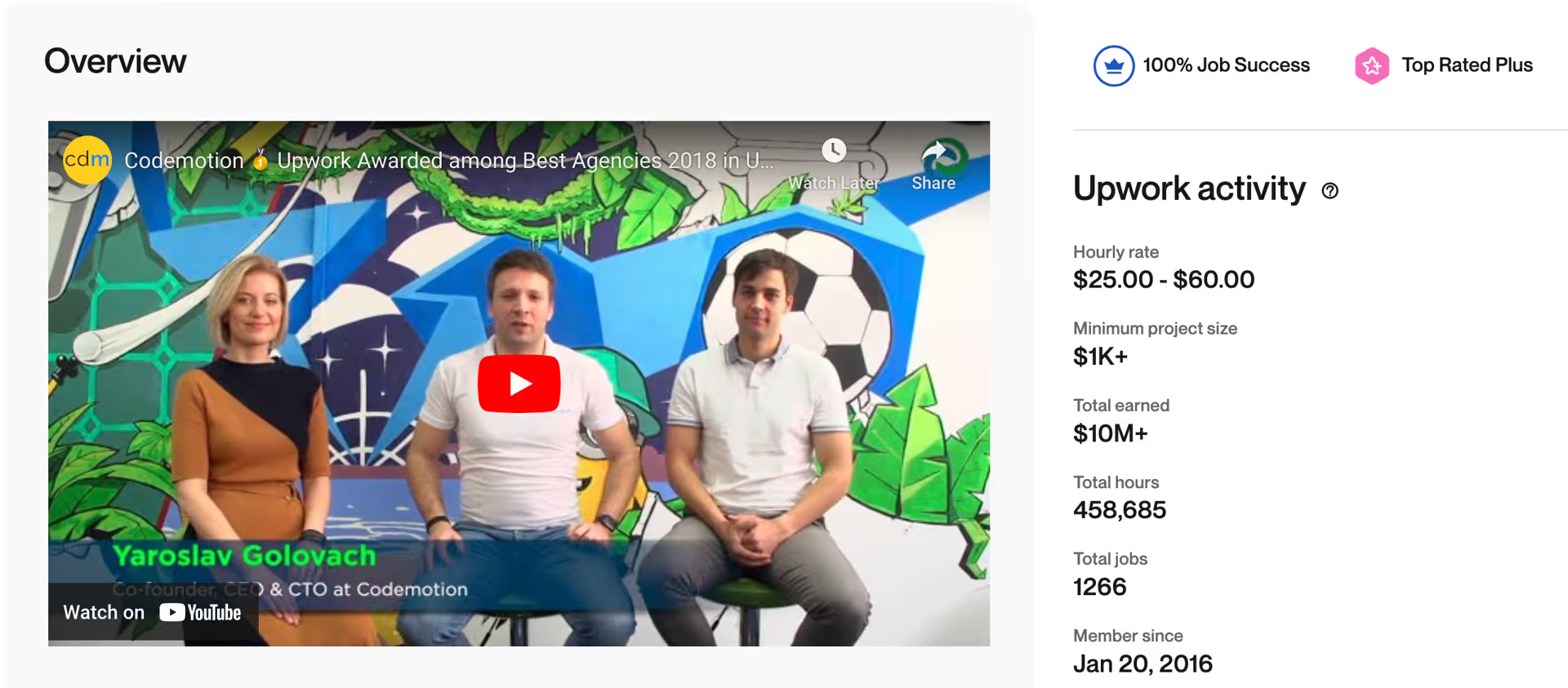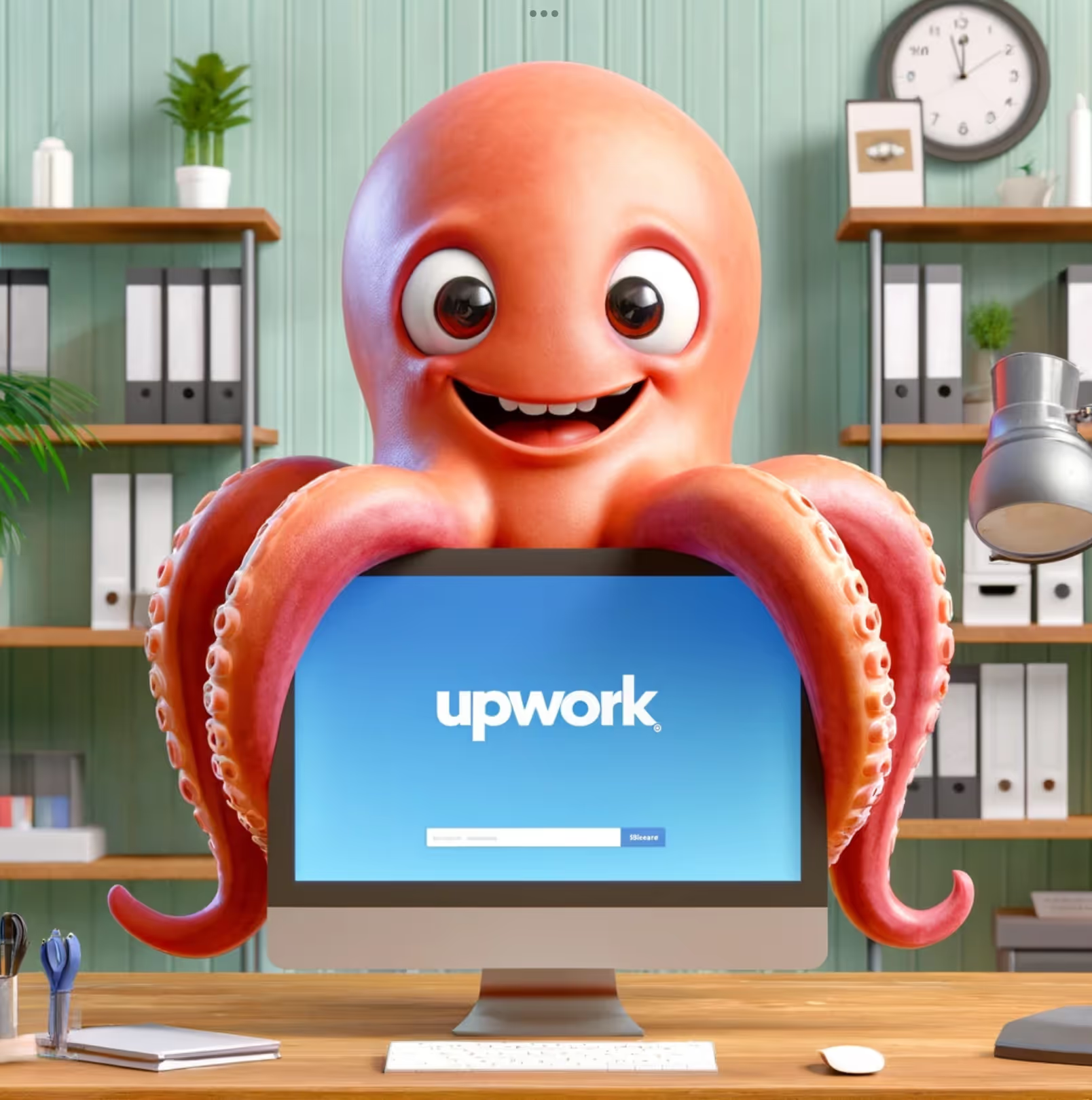From $20 Contracts to 1.5 Million Dollar Deals
Now a $10-million industry leader, Codemotion started out as a small 5-person Ukraine-based IT business 13 years ago. As Co-founder and CEO Yaroslav Golovach recalls, the very first Upwork project they undertook was a $20 contract signed in February 2017, when the company decided to go global. Today, Codemotion’s 100-person team is snatching hot million-dollar deals on Upwork by uniquely tailoring its profile and cover letters to clients' needs. The company’s success is undoubtedly impressive, but the path to this success is even more fascinating.

Finding Their Niche 🪡
Yaroslav was once a developer, working on 3-D games as a student at Kyiv Polytechnic Institute and mastering all kinds of programming languages, be it Java or C+. Even though he was a jack of all trades, he decided to stay focused on web and app development, won his first few jobs, started to scale, and built his team with high-level experts who knew how to solve client problems. When discussing this in detail, Yaroslav mentioned that the key weakness to avoid is trying to be and do everything, instead of focusing on one specific field:
It’s hard for clients to trust a one-armed octopus.

The Customer is Always Right
Like all companies, during their years of growth and prosperity, Codemotion could not escape failures. When reflecting on these times, Yaroslav mentions:
It is vital to make the client happy in any circumstance.
To avoid bad reviews that could seriously damage their reputation, Codemotion has a track record of returning money to unhappy clients. Failures happen, and they require action. When discussing this, Yaroslav notes:
Throughout the history of Codemotion, we’ve had to use the Upwork feature to delete bad reviews about 10 times.
Failures are an important part of growth. Without them, it’s hard to see clearly what weaknesses the company has and which Achilles heel(s) they need to address.
A Ying-Yang Approach to Business ️
After years of being in the game, Yaroslav has learned to strike a balance between playing it safe while not being afraid of taking risks:
At Codemotion, I am the kind of person who advocates for taking risks. I am very much an optimist. It helps having a partner like Maryna who literally scans through every detail, while I go full-on cowboy style. We see a situation from different perspectives and this helps us land on a perfect middle ground.

Facing risk bravely has had its costs. For instance, after having worked with a client, Codemotion agreed to do a $70,000 project with a delayed payment. Upon completion of the work, the client went radio silent and claimed they ran out of funding and never paid. Discussing this in detail, Yaroslav notes:
We’ve had two clients like this so far and it taught us that taking overly brave risks is not feasible. But sometimes we do things for free for a brief amount of time if there’s a track record of working with that client.
Unlike this example, some risks can actually be taken. As Yaroslav highlights, some clients might not have all the necessary capital raised at first, but they still need a good enough product to attract investments:
In this case, we offer a Happy Pass Delivery. We basically say that you don’t need to spend $100K on a complete product but rather have a good enough beta version that can be built in just a month.
Using such an approach, Codemotion capitalized on smaller projects that eliminated the risk of financial loss which turned into major contracts later on!
The Decision-Making Process of a CEO 🤔

Having started out as a small agency, Codemotion is a key player in the Upwork game today. The company has a highly skilled team of experts, rigorous processes in place, and risk management tools to ensure continued stellar performance. Reflecting back on the days of building his empire, Yaroslav noted:
If I had known what was coming, I wouldn’t have put on this hat. A CEO is a kind of risk manager who decides between different mitigation paths and chooses the one that will yield the most benefits. It’s crucial to stay focused on what’s important at the moment instead of trying to build HR or organize some processes of secondary importance. In 2015, we were transitioning into an external market and had to concentrate our efforts on making the right decisions. We left our major partner behind and started hiring people who prioritized delivery.
Getting to Codemotion’s level is no joke. As Yaroslav puts it, growth implies investing time and resources but doing so efficiently:
First, you have to understand what you’re selling and grow your reputation in that direction. A $20 contract might not be financially attractive, but it can give you a great review on Clutch.co. Moreover, a business makes no sense without sales so you have to set up proper channels. Second, you have to develop your relationships with clients, call them, and communicate with them. Third, once there are not enough hands to run the business, you start building the processes and expanding the team. Finally, crises will always happen both internally and externally, once every two years. You have to plan for them in advance. Your best employee may leave, or you may lose the biggest contract, which happened to Codemotion, and we had to learn the hard way to be prepared for crises like this.
The Secret Recipe for Success

Codemotion is a bright example of hard work. While it may seem that it simply focuses on basic outreach and communication with clients, the company’s strategy tackles so much more than that. When inquiring about the biggest secret to success on Upwork, Yaroslav notes:
Upwork is a super competitive platform. You have to send bids and reply immediately. The way you set up this process is up to you, be it replying at night, especially to U.S. clients during their business hours. You must react and get on calls at any time. By the way, the biggest client I have brought - who generated more than $1.5 million in our company revenue - came from a 2 AM call. I was at a club with my friends in Kyiv and saw a reply on Upwork. I understood that I had a choice: to stay with my friends or win a client. So I got in my car and talked to the client for an hour.
While having a round-the-clock team is the most logical solution, Codemotion has taken its lead generation efforts to a more advanced level with GigRadar. With the help of automated quality bids sent to a list of relevant jobs 24/7 within 10 minutes of their posting, Yaroslav and his team were able to get more leads without having to sacrifice sleep. GigRadar also allowed them to invest more into converting leads into clients and, consequently, increase the company's revenue.
If you are inspired by Codemotion's success story and compelled to follow in their footsteps, Yaroslav offers a final parting advice to keep in mind:
At Codemotion, we consider every client ideal. Before we find out what makes him or her imperfect, we go for that client full-force. Sometimes, job descriptions will be almost blank, but that doesn’t mean that the client is bad. One of the biggest clients I’ve found had no details in the job post.
Closing Thoughts
Yaroslav’s story of building Codemotion to the powerhouse it is today is a tale of a cowboy styling deals with a great deal of tenacity. Codemotion’s path proves that success comes with a lot of sacrifices and risks, but in the end, it is worth it. And we say “YEEHAW!” to that. 🤠


